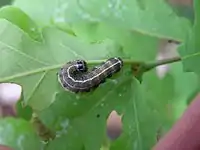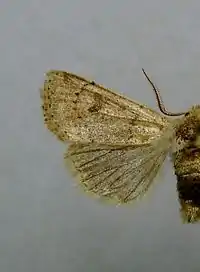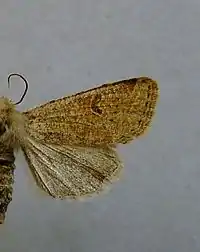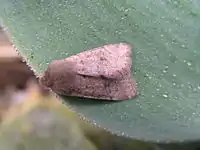Orthosia cruda
Orthosia cruda, the small Quaker, is a moth of the family Noctuidae. It is found in Europe, Morocco, Algeria, Tunisia, Turkey, the Caucasus, Transcaucasia, Kazakhstan, Israel, Lebanon, Cyprus and Jordan.



| Small Quaker | |
|---|---|
 | |
| Scientific classification | |
| Kingdom: | |
| Phylum: | |
| Class: | |
| Order: | |
| Family: | |
| Tribe: | |
| Genus: | |
| Species: | O. cruda |
| Binomial name | |
| Orthosia cruda (Denis & Schiffermüller, 1775) | |
Technical description and variation
The wingspan is 28–32 mm. Forewing grey brown, dusted with dark grey and reddish atoms: inner and outer lines marked by black spots on veins; submarginal line pale, indistinct; upper stigmata dark grey edged with pale and then with rufous; hindwing dull grey. Like Orthosia stabilis, which it resembles in colouration, it varies according to the amount of red shown; — thus pallida Tutt is a very pale grey form without red, but sometimes slightly ochreous-tinged; — pusillus Haw.is a darker grey form without red admixture; — nanus Haw. is like the typical form, reddish grey, but paler; — rufa Tutt is a rarer, reddish form; — lastly, ambigua Hbn. represents a dark red-brown or grey-brown insect with the lines and markings well shown.[1]
Biology
The moth flies in one generation from the end of February to mid-May.
Larva yellowish green, sometimes brown; dorsal and subdorsal lines fine, yellowish white;spiracular line broader and yellower; anal segment with a yellow cross bar; spiracles white with black rings. The larvae feed on various deciduous trees, such as oak and willow. It lives between leaves spun together.[2]
Notes
- ^ The flight season refers to Belgium and the Netherlands. This may vary in other parts of the range.
References
- Seitz, A. Ed., 1914 Die Großschmetterlinge der Erde, Verlag Alfred Kernen, Stuttgart Band 3: Abt. 1, Die Großschmetterlinge des palaearktischen Faunengebietes, Die palaearktischen eulenartigen Nachtfalter, 1914
- "Robinson, G. S., P. R. Ackery, I. J. Kitching, G. W. Beccaloni & L. M. Hernández, 2010. HOSTS - A Database of the World's Lepidopteran Hostplants. Natural History Museum, London".